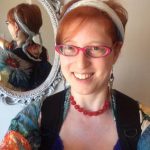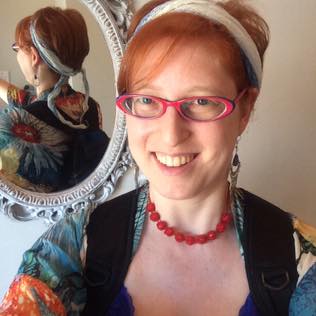Kohenet Annie Matan
 I am a freelance Spiritual Leader and Founder of Matanot Lev (Gifts of the Heart), a radically inclusive Jewish community in Toronto. I specialize in creating and facilitating sacred experiences through a Jewish lens for people of all backgrounds. I widen the gateways of access to Jewish community, helping seekers find welcome and wisdom in Jewish spaces without leaving any part of themselves behind.
I am a freelance Spiritual Leader and Founder of Matanot Lev (Gifts of the Heart), a radically inclusive Jewish community in Toronto. I specialize in creating and facilitating sacred experiences through a Jewish lens for people of all backgrounds. I widen the gateways of access to Jewish community, helping seekers find welcome and wisdom in Jewish spaces without leaving any part of themselves behind.
Trained as a Kohenet in the Jewish Renewal community, I am inspired to weave contemporary and traditional Jewish liturgy as well as prayers, songs, and poems from other traditions. Going a step farther, I am interested in being a part of a multi-faith world where wisdom of all backgrounds is shared and sacred experiences are co-created with the aim of dissolving lines dividing cultures and faiths. I believe maintaining distinctions and separations is counter-productive in creating a loving and empathetic world.
My work is most closely aligned with Rabbi Schwarz’s Kedusha and Kehilla themes in that every offering I create or facilitate emphasizes meaning and connection to self, divine and community. I serve Jews of all ages and backgrounds, including interfaith, patrilineal, Jews by choice (including those in conversion process), LGBTQ+ folks and people of all abilities as well as seekers of Jewish wisdom from other backgrounds. Every participant is invited to participate in all aspects of our un-services, without limitation or question. Everyone is Jewish enough to be included. And, most importantly, everyone is invited to acknowledge, name, own, and bring all parts of themselves, and their families into each experience, including memories and traditions that are brought from outside the Jewish sphere.
Each experience I facilitate is founded on the principle that everyone present is an active participant, changed by the experience. There are no bystanders. At the Shabbat family program that I lead, children and grown-ups are named together in our welcome songs as family members. Grown-ups are invited to share how they are feeling, as well as their sweet and challenging moments from the week, within the context of our preparation for Shabbat. The impact of this level of inclusion is powerful. At a recent Shabbat program, when I asked for feedback about how it was meeting participants’ needs, a Filipina nanny shared that she was here, with the baby she cares for, on her day off. She had already worked her hours for the week but had asked her employers for permission to attend this program with their child because it’s her favorite part of the week.
Rituals are co-created with the individuals and families that I serve, using their spiritual language. I include transliteration and translation in all printed materials and tailor translations with feminine/non/multi-gendered/ God/dess language (or no God/dess language at all) and modern English, etc. I believe that if the ritual is for you, it should feel and sound like you. I encourage and support those I serve to acknowledge, own, and bring all parts of themselves and their families into the experience.
Matanot Lev was founded to make sacred, Jewish space available to those, like me, who felt a need to experience Jewish spirituality and wisdom in a contemporary, creative and out-of-the-box framework. Embracing feminine God/dess and communal language, weaving in writings from other traditions, and prioritizing accessibility in all ways, it was the first explicitly post-halakhic Jewish prayer offering in the city. I even went as far as explicitly letting people know that they would not be yotzei (in fulfillment of their religious obligation of Shabbat observance) by attending this service.
I offer Jewish wisdom about slowing down, being more present, taking more breaths and making more space to connect with each other and our surroundings in each moment. At Shabbat dinners, every bracha is proceeded by a kavannah, often through a chant or storytelling. Participants have reported that these experiences have enabled them to access the meaning of Jewish liturgy and their own relationship to the Divine and Jewish tradition more than ever before. At a recent Shabbat dinner, several participants said “I didn’t know a Shabbat experience in Toronto could be like this.” They commented that the singing was fun, they felt well cared-for and welcomed and found the service and prayers to be meaningful and inclusive.
Matanot Lev Un-services prioritize kavannah over keva in Jewish sacred experiences. Our recent Yom Kippur retreat was a 13-hour experience from Kol Nidrei through Yom Kippur day, which offered a deconstructed model of Yom Kippur with discrete ritual modules for each of the key components of the liturgy. Each was woven with chanting, mindfulness, and hands-on activities. We had 20-30-minute breaks between each one and people were encouraged to come and go, rest and even eat, as needed for a day of deep connection and presence. I described Yom Kippur as “a journey into yourself with company” and invited participants to prioritize self-care throughout the day. Aimed at Jews who were seeking a meaningful and engaging Yom Kippur outside of the rote synagogue experience, I highlighted personal connection over traditional practice. For example, our Yizkor ritual was a co-creation to remember our ancestors and heal our line. Sitting in circle, we named ancestors whose attributes and traumas we were afraid to own or pass on in our families and blessed them with the healing we wished they had received when they were alive. Through this practice, we were able to name family histories we had been ashamed of, find empathy for family members we had felt alienated from and transform shame and shadow into blessings, acceptance and hope.
In my work, I also try to bring balance to a different set of four approaches: through the lens of the Kabbalistic four worlds of Asiya (physical), Yetzirah (emotional), Briya (mental), and Atzilut (spiritual). Traditional Judaism has been best at engaging our minds through written and oral wisdom. I aim to also offer more opportunities to connect with our embodied wisdom, our bodies themselves, our connection to the Divine, and of course, to our hearts.
At Matanot Lev, inspired by the Ve’Ahavta section of the Sh’ma, I preach often about love. That the hardest and most important work in the world is to love everybody. Beginning with ourselves and including even those we don’t like. For our Aleinu, using Taya Shere’s chant from the Kohenet siddur, we sing “we will be Shechina, in the work of our hearts and our hands”, understanding that it is through the work of our own hands that we create the world in which we live and that it is upon us to bring about the world to come. We call out the work that needs doing, whether or not we feel capable of undertaking it. And we also call out our visions of a more loving, healthier community, society and world at large.
____________________________________
Kohenet Annie Matan is the Founder and Spiritual Leader of Matanot Lev (Gifts of the Heart) in Toronto. She is passionate about creating and facilitating meaningful Jewish experiences that are accessible and open to people of all backgrounds and is known for weaving contemporary and traditional Jewish wisdom, liturgy and music to ground and enliven the workshops, rituals, and unservices that she facilitates.



November 5, 2018 @ 10:54 am
ahhh. so much truth, so healing of all of the separations.
November 5, 2018 @ 8:25 pm
Kol Hakavod! Let me know if you are looking for a blogger for any of your events!
@PK Press